One of the biggest hang-ups for people as they start dreaming about living a life on the road is how they’ll make money.
Maybe the only positive thing that came from Covid is that so many more remote opportunities became available to people. Still, the idea of how to find a reliable cell signal or how to manage the logistics of traveling while working can seem daunting.
For the last two years, I’ve worked my job from my van while traveling all over the US. I constantly get messages about how I make this work, so I’ve compiled answers to your most-asked questions below!
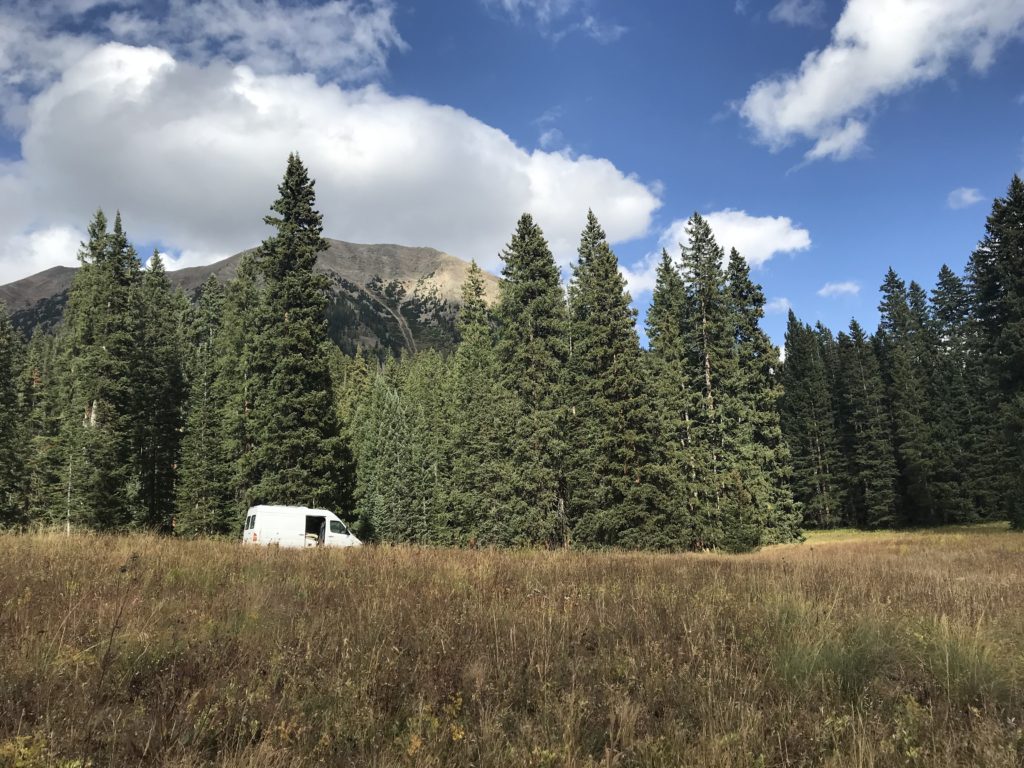
How do you get internet from your van?
The internet solution that has worked best for me is using a hotspot. I realize some of you might not even know what that entails, so I’ll break it down for you.
Most smartphones these days can be turned into a “hotspot” or used to create a wifi connection for other devices, for instance, a laptop. I can make my phone into a hotspot, which my computer can then locate and log on to just as it would for any Wi-Fi network.
While most smartphones can do this, you’ll need to check your phone plan to see what kind of hotspot data your plan provides so that you don’t end up with surprise charges for using your hotspot.
There are also separate hotspot devices that can be purchased that do the same thing. I find that my hotspot device often provides a stronger, more stable connection than my phone hotspot does. Here is the Verizon hotspot device that I use- Verizon Wireless MHS900L Ellipsis Jetpack, MiFi Hotspot
Turning your phone into a hotspot will take your phone signal and create a Wi-Fi connection that matches the same strength as your phone signal. This means if you’re in an area with a weak cell signal, you’re also going to have a slow internet connection on your computer.
How much does it cost and how much data do you use?
This might be different for everyone, but here is a breakdown of how it works for me financially…
My phone plan is through AT&T. I have the Unlimited Elite plan, which gives me 30GB of high-speed hotspot data for $110/month. This is separate from the data that I use for surfing the internet from my phone. Most unlimited plans have a certain amount of high-speed hotspot data before they slow down your speeds. Once my speeds are tethered, they’re too slow for me to do my job.
My Verizon hotspot is actually on my parent’s phone plan (thanks mom and Mel). Having a hotspot as the only line would cost me something like $80, but if it’s bundled with other lines, it’s only $20/month. On this plan I have 15GB of high-speed data.
45GB of data is always enough for me each month for a job that is entirely video conferencing. Depending on your job and the amount of hours you work, your data needs may be different.
If you need more high-speed hotspot data than that, you can also purchase a hotspot but pay for multiple lines (which will give you multiple SIM cards to switch out). As you reach your data limit, swap the SIM cards to use the data on your other line. This option is obviously more expensive, but where there’s a will, there’s a way!
For my first year on the road I only had Verizon, and for the most part, this worked well. Sometimes though, there were campsites that I’d arrive at only to find that there was no Verizon signal, but friends who had AT&T had service. I decided that being able to double-dip into both networks would give me more options for where I could travel.
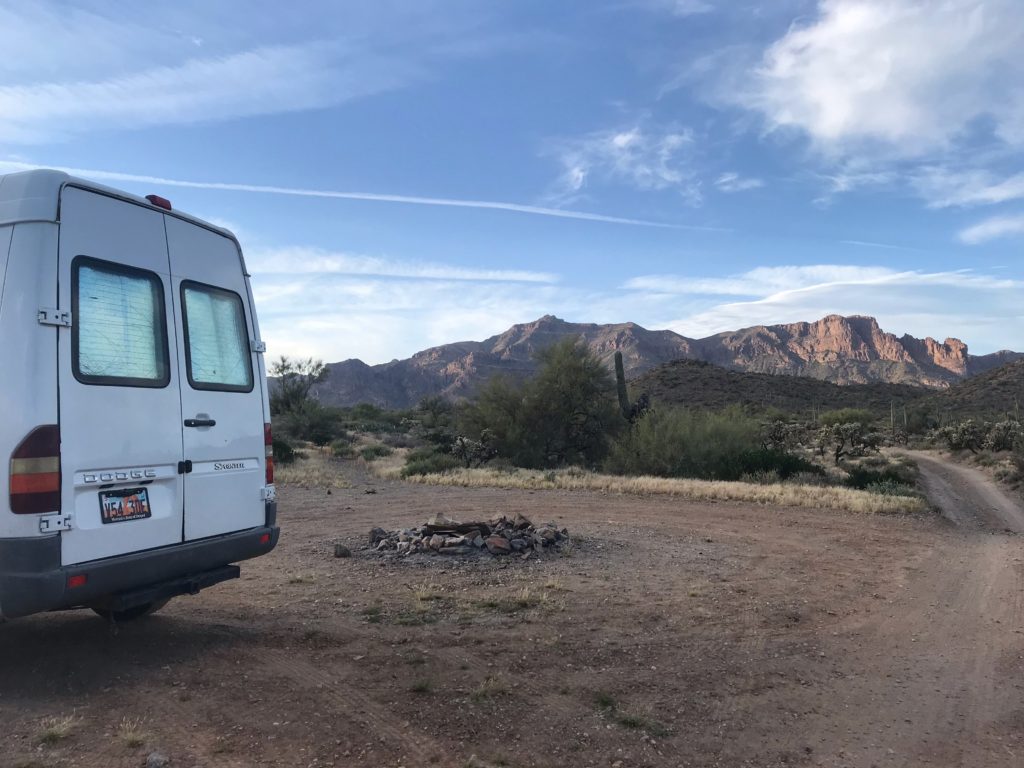
How do I make sure I have a good signal strength?
As I mentioned before, your internet speeds will be determined by your cell signal strength. When I’m finding a new campsite, I must find one with either an AT&T or Verizon cell signal.
When I get to my potential campsite, the first thing I do is test my signal strength. I use the Ookla Speedtest app on my phone to run a quick test of my signal.
The signal strength you need depends on your job. For my video conferencing, I try to find a spot with a ping below 100ms (the lower, the better for this number), a download speed of at least 10mbps and an upload speed of at least 2mbps. Obviously, the better those numbers are, the better my connection will be.
Even with two networks to work from, I’m limited on where I can camp. My job has overnight hours which means I need to sleep where I’m going to work, and I don’t have the luxury of driving into town for my workday like many people do. When I’m looking for campsites, I try to have a plan B and C in case my plan A doesn’t have a good enough signal.
One tool that I use that helps me work from even more locations is a signal booster. This attaches to the roof of my van and amplifies the cell signal. This isn’t a magic cure for not having service though. If you don’t have a signal, you still probably won’t have a signal with the booster. But if I have a weak signal, turning on my signal booster can often make the signal strong enough for me to work from.
The signal booster that I use is the WeBoost and I highly recommend it for anyone trying to work from the road full-time. Not only has it opened more places for me to work from, but it has also given me a shred of a cell signal when my van broke down and I needed to call for a tow! You can get your own WeBoost here.
Where have you been able to teach from?
I strictly boondock, which means that I camp for free without any services like electricity or water. I never stay at campgrounds or RV parks, so I never stay in places that have Wi-Fi. My van runs off solar which allows me to stay just about anywhere and I take advantage of that as much as I can by staying away from cities as much as possible.
I’ve worked from spots all over the United States. I’ve worked next to the ocean, camped up in the mountains, in the middle of the desert, and even down by the river (haha).
We live during a time where cell signals are prevalent in most places, which makes working from the road that much easier.
However, I have also had days where I’ve tried 3 different areas looking for a signal, only to spend the night in a Walmart parking lot where I had service. That’s the sacrifice you sometimes must make to live this lifestyle.
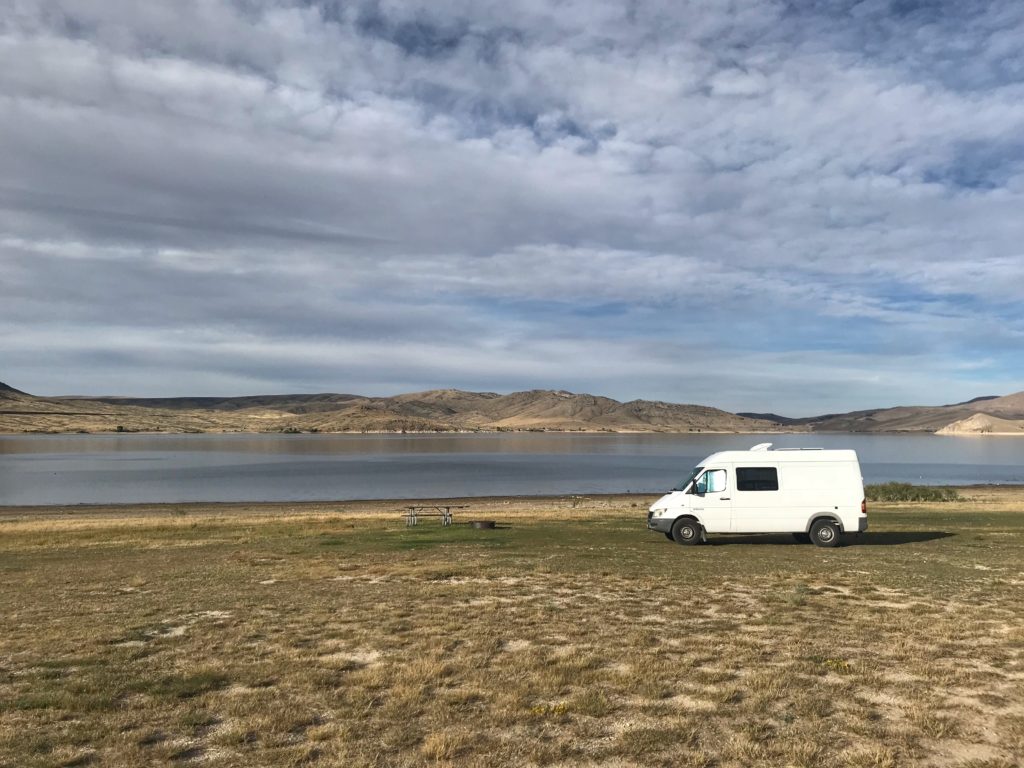
Other options for working
I mentioned that I work a job with some wacky hours, which means I have to rely entirely on my cell signal to provide me with internet. People who keep more normal job hours have plenty of other options though.
I have lots of nomad friends who spend their days working from local coffee shops or breweries to use more reliable Wi-Fi (or Wi-Fi that doesn’t dip into their data for the month). McDonalds is also a great option and occasionally you can even park outside and still connect to their Wi-Fi.
Local libraries and sometimes even city parks offer free Wi-Fi, which eliminates the need to purchase something in exchange for internet privileges.
Things to consider
Here are a few other things I’ve learned about cell signals on the road over the last couple years.
First, if you get to an area that you’re hoping to camp in and you don’t have a very strong signal, keep driving around. Sometimes the signal in one campsite is completely different from the signal two campsites over. Nearby mountains or rock formations can change the signal you get from site to site.
Spots that are up higher sometimes offer a stronger signal strength (but not always). When trying to find a spot, this is something to keep in mind.
Another thing I’ve noticed with cell signals on the road is that my signal speed can change depending on the time of the day. Working overnight gives me an advantage because I’m the only person using the cell towers at that time. But I stayed in a spot once that had only one cell tower for the entire town and while my signal was great overnight, if I tried to use it in the evenings or on weekends, it was too slow. I contacted Verizon, who told me that many people in that area were using the towers and most of them also had their home phones and internet service through Verizon, which bogged down the towers even more.
When searching for a place I can work, cell signal bars doesn’t always correlate to signal strength. This can be confusing, but I’ve worked in spots with 2 bars and had great speeds, and I’ve arrived at places with 4 bars that I couldn’t work from. Several of the apps I use to find campsites (iOverlander, Camendium, FreeRoam) also indicate cell signals, but knowing how many bars you get in a spot isn’t enough information. You have to run a speedtest once you’re there.
One last tip I’ve learned about cell signals is that being closer to a cell tower doesn’t always mean a better signal. Often, cell towers are located up high, for instance, in the spot I typically stay at in Salt Lake City, the tower is up on the mountain ridge we call the “Point of the Mountain.” I have a great signal down away from the tower, but the campsites are near the tower up along the ridge. Being so close and on the same plane as the tower prevents me from getting the signal. Sometimes it’s advantageous to be a bit further from the towers.
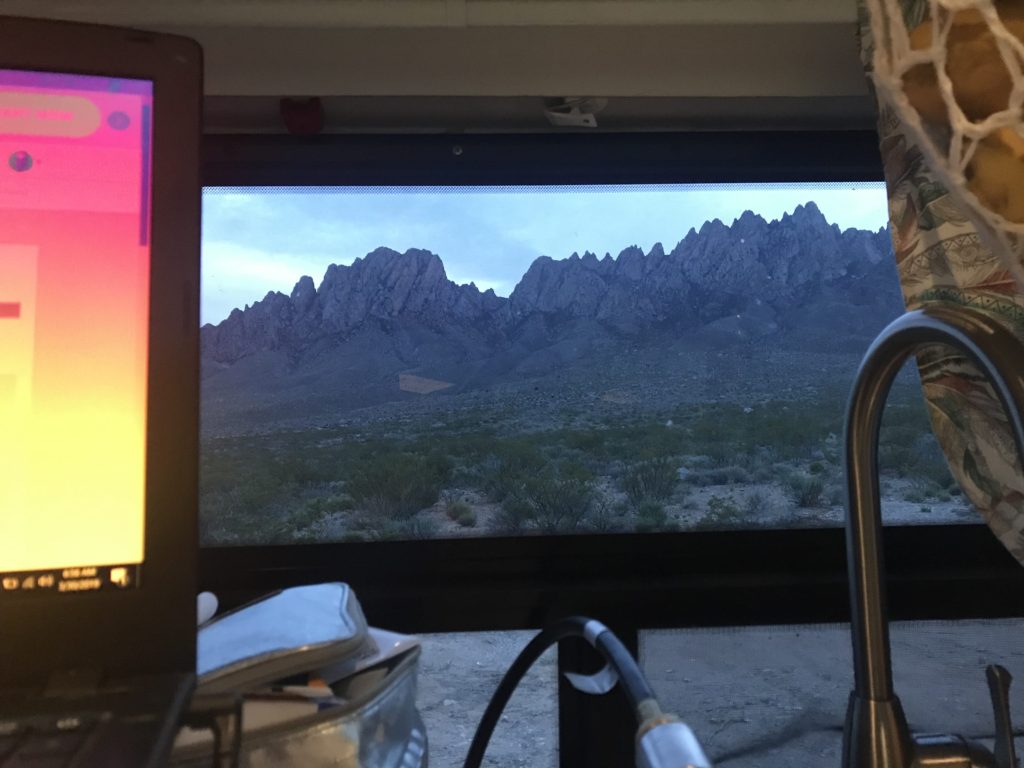
What I do for work
I figured I’d include this information here as well since it’s one of the questions I get asked most often.
For the last two years I’ve taught English online to kids in China with a company called VIPKID. The classes are one-on-one and are 25-minutes each.
I love my job. It has the best parts of teaching without all the extra nonsense. All the lessons are even planned for you, so you just show up, teach, and then close your computer when the time is up. I’ve enjoyed no longer carrying home the stress of a classroom after work hours.
With this job, you are an independent contractor so it doesn’t provide benefits and you get a 1099 for taxes. In exchange though, you choose your own hours. There’s no more requesting time off work or counting vacation days. There are no minimum hours required, however, you only get paid for the time you work.
VIPKID does require a bachelors degree (in any subject) and if you do not have a state-issued teaching certificate, you’ll need a TEFL certification, which can typically be found on Groupon.
VIPKID only hires US or Canadian citizens and is no longer hiring from California, unfortunately. If this is a job you’re interested in pursuing, please send me an email at je***@ad******************.com and I’d gladly answer more questions and walk you through the application process.
You can find more info about the company or apply though this link:
If you want it bad enough, you’ll make it happen
There’s no perfect way to make a living on the road.
Some of my friends work full-time, some work part-time, and others freelance and piece it together however they can.
I also know plenty of nomads who don’t work remotely. They pick a place and work seasonally, then find a new location.
If you dream of a life on the road, you might just have to think outside of the box for ways to creatively make money to fuel your dream.
See you on the road!
Also, if you found these tips useful, you can share your support through our Patreon or buy me a beer (Venmo: @Jenlev110). If you know someone else who might find this article helpful, please pass it along to them!
Note: this post contains affiliate links, which means that just by using my link to shop as you normally would, I get a commission. This doesn’t cost you any extra money but helps to support me and keep my blog alive!
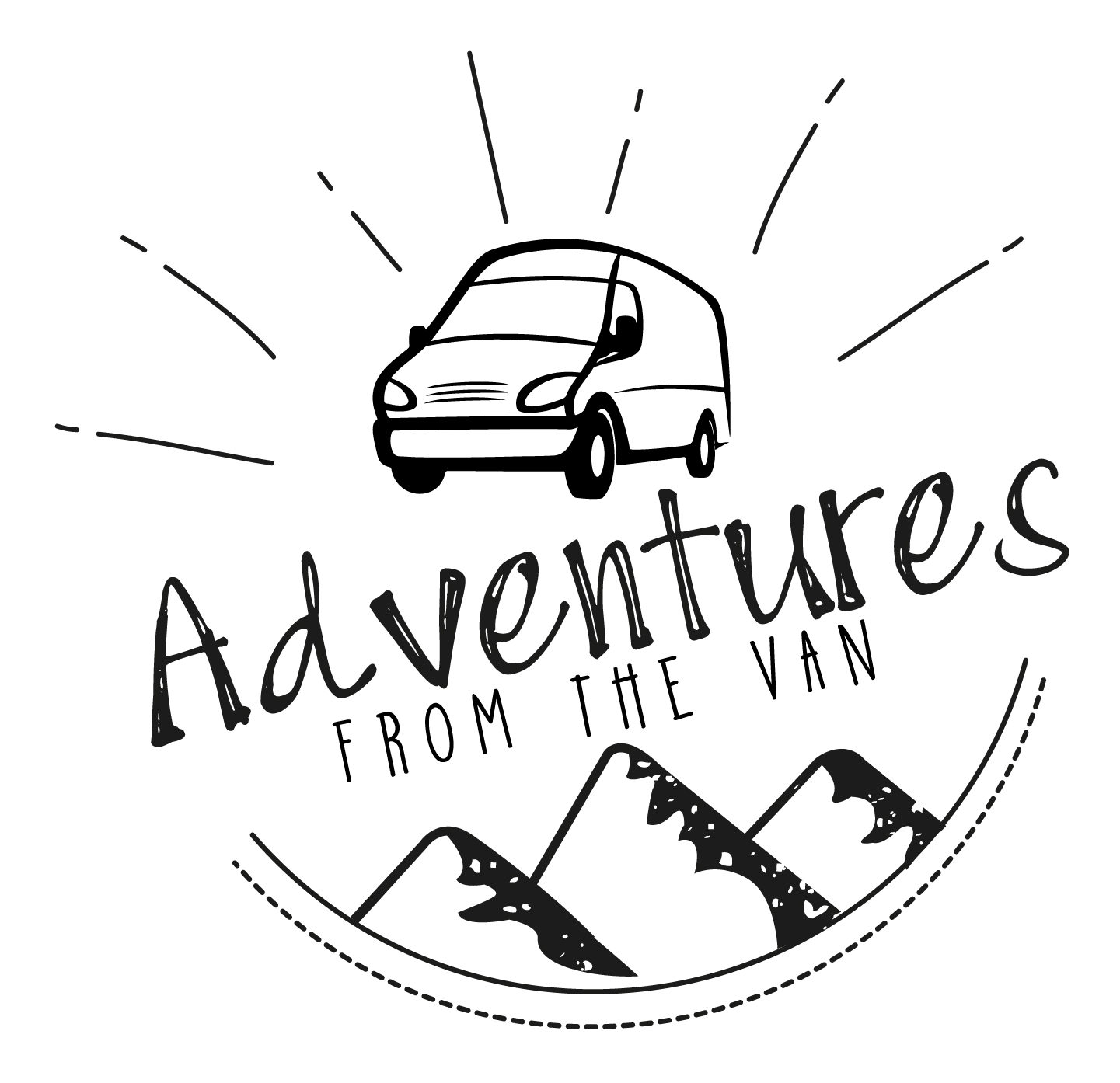
This was really helpful!! Thanks for sharing the details and how-to!! I appreciate knowing how it all fits together: signal strength, data usage, speed, etc. Thanks so much!!!
You’re welcome! Thanks for reading!
Thanks, Jenny, very interesting and informative. Though, after 20+ years living out of an Army rucksack, I have know desire to live in the road or go camping, for that matter, it’s still interesting to hear how you make it work.
I am interested in the VIPKID thing for myself and possibly my daughter. I’ll email you to get more info.
Haha life on the road certainly isn’t for everyone! Most people prefer creature comforts 🙂
And yes, definitely send me a message. I’ll gladly answer all of your questions and help you through the interview if you decide to apply!
Great info. Interesting what you said about using a hotspot vs a phone for data. We use a phone and I’m hard pressed to see 10 down even when we have 4 bars.
I’d like to know more about your weboost. I’ve not heard good reviews, but sounds like it’s working for you if your regularly getting 10 down.
FWIW, we have prepaid Verizon (Visible) and T-mobile (Mint) – and a great majority of the time we have better connection through T-mobile.
Hey Amy! Thanks for the comment!
I definitely recommend the WeBoost especially if you’re traveling most of the time. I have the older model, the one I’ve linked to has an even better antenna and my friends who have the new one usually have even better connections than I do.
It’s interesting that you’re having so much trouble getting even 10 down with Verizon! A lot of that probably depends on where you’re located. Are you traveling all around or are you central to a certain area?
I’m a VIPKid teacher too! While I’ve traveled while teaching, I’ve never gone totally nomad like you. This sounds so freeing! Maybe someday I can try it!
Hey Kimberly! Yes, it’s SUCH a great job for traveling! Thanks for the comment!
Thanks so much for taking the time to write this post and share these useful tips. I don’t like on the road but it is something I am definitely interested in doing down the road so anytime I see others currently doing it I always enjoy reading their posts, watching their videos and just learning as much as I can. This is probably one of the most important things to consider when it comes to your job because if you have no internet then you simply can’t work so it’s good to do research beforehand and know what your options are. I have heard mixed reviews about VIPKID, just like anything else, but I may take a look again and see if it’s something I can incorporate and gradually grow. Thanks!
Hey Kelly! I’m glad you found this useful and thanks for commenting! How I travel and work (particularly how I get a stable internet connection) is always the most-asked question. It’s usually what holds people back from giving it a shot. If you decide to pursue VIPKID please let me know. I’m happy to chat more about my experiences with the company!
This is a very interesting post. I have thought often about working remotely from an RV
Thanks for reading, John! It’s amazing how many more people are making moves to live in RVs and work on the road since Covid. It’s a pretty cool lifestyle in my very biased opinion, haha.
Thanks for all the info! Van life is hopefully somewhere in our future, but for now we just take the opportunity to camp and travel, but we don’t always have wifi! I’ve been curious how to make it work – thanks for sharing!
Thanks for reading, Erin! I definitely have to decide where to stay based off whether I can work from the campsite, but it’s possible to do it! Hopefully we cross paths on the road someday!
Hi! Thank you for this info. My husband and I are thinking of retiring to the Bahamas in about 10 years so these items are something to think about if we still have to work at that time! I also like how you teach kids from China from your van! That is so cool! Thanks for giving me options to travel the country while earning a living, I hope to be able to do it one day! I followed you on Instagram too!
Wow! The bahamas?? Sounds amazing! Thanks for reading and following along, Christina!
This is so interesting. I always wondered how everything works on the road. Thanks for explaining.
You’re welcome! Thanks for reading, Jessica!